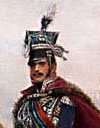In other respects too, L'Armee du Nord, was beset with dangerous difficulties. A disconcerting degree of suspicion and mistrust doffed the relationships between the soldiers who had remained loyal to the Emperor throughout his fall and exile and those who had compromised their military oath and taken service under the Bourbons. This atmosphere pervaded all ranks, from the highest to the lowest, and to some extent made the morale of the Army of the North brittle. As the historian Houssaye describes it, the army of 1815 was "impressionable, critical, without discipline and without confidence in its leaders, haunted by the dread of treason, and on that account, perhaps, liable to sudden fits of panic; it was nevertheless inspired with warlike aspirations and loving war for its own sake, fired with a thirst for vengeance; it was capable of heroic efforts and furious impulses; it was more impetuous, more excited, more eager for the fray than any other Republican or Imperial Army after or before it. Napoleon had never before handled an instrument of war that was at once so formidable and so fragile." Indeed, it can be argued with considerable justice that Napoleon miscalculated the caliber of his army, regarding its quality with, if anything, misplaced optimism. But by June the time had come for action; the path was chosen and had to be followed to the end.
French Army Strength
~ D. Chandler, The Campaigns of Napoleon, p. 1023






































































































